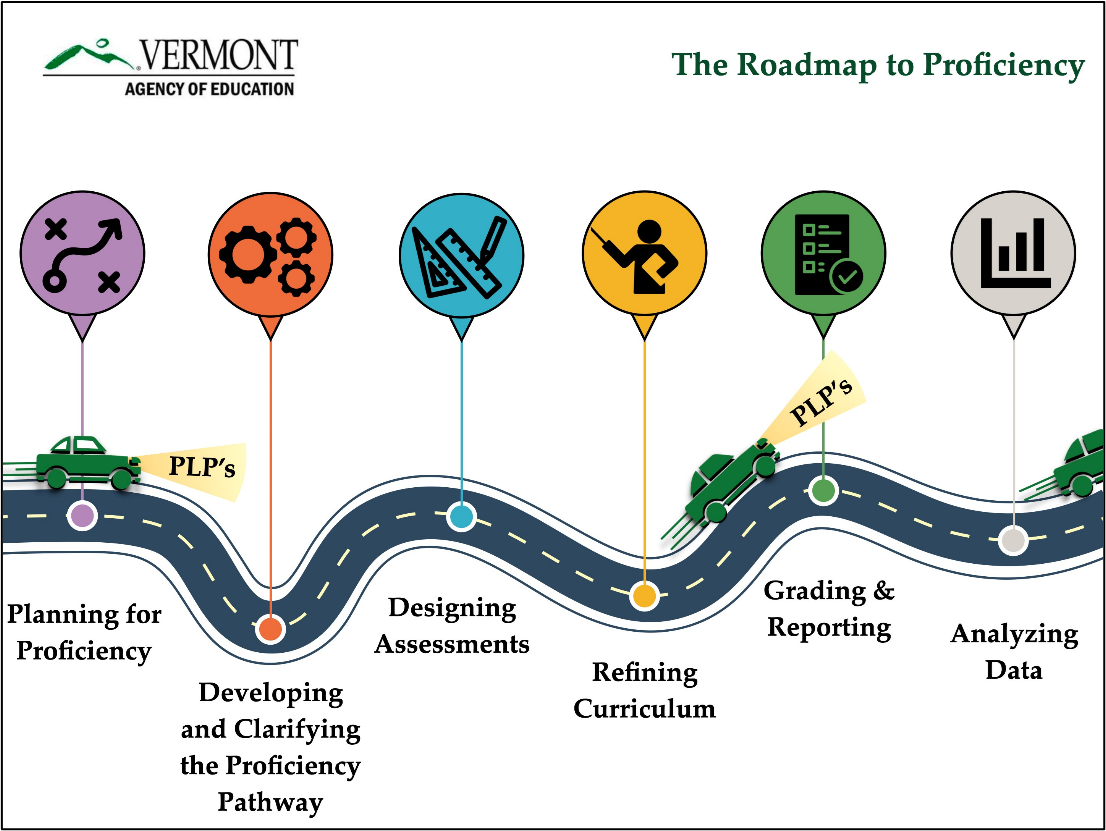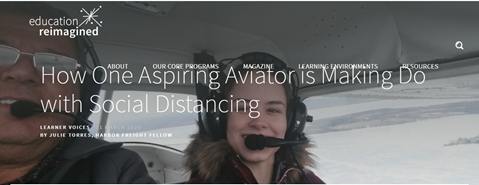“One consistent finding of academic research is that high expectations are the most reliable driver of high student achievement, even in students who do not have a history of successful achievement.”
-Doug Lemov
Proficiency-Based Learning is a key component of flexible and personalized pathways set forth in Act 77 and the State Board of Education’s Education Quality Standards. Vermont public schools must provide students with flexible and personalized pathways for progressing through grade levels and to graduation. These resources can help educators and families understand some of the changes that are taking place in Vermont schools.
The Framework for Proficiency: Resources to Support Implementation
The Vermont Framework for Proficiency has been developed over the course of three years to support Supervisory Unions/Districts in developing a coherent, coordinated, and culturally sustaining approach across schools and school districts so that every Vermont learner is empowered to attain the attributes described within the Vermont Portrait of a Graduate.
The Vermont Framework for Proficiency: Resources to Support Implementation is composed of stackable documents that enable educators to access the information that is most relevant to the needs of a particular school system. It is organized from a backward-designed perspective so that the initial documents lay the foundation for subsequent work and inform decisions regarding next steps.

The Roadmap to Proficiency identifies essential system components within the Framework for Proficiency that empower students to meet the expectations within the Vermont Portrait of a Graduate (PoG). The PoG represents the destination and the guarantee to students, families, and community members that Vermont learners are prepared for college, career, and civic life upon graduation. The system components include Planning for Proficiency, Developing and Clarifying the Proficiency Pathway, Designing Assessments, Refining Curriculum, Grading and Reporting, and Analyzing Data. Within this system, Personalized Learning Plans (PLPs) play a crucial role in capturing the breadth and depth of academic and experiential learning opportunities students engage in as they progress along their pathway to graduation.
Participatory Action Research: An Opportunity for Collaboration
Participatory Action Research (PAR) offers an approach that can lead to meaningful and lasting improvements in educational systems by actively involving a variety of stakeholders in the research and decision-making process. PAR ensures that the work is relevant to the specific needs of an educational community and can therefore lead to solutions that are more likely to be effective and sustainable. The Vermont Framework for Proficiency: Participatory Action Research provides background information regarding PAR as well as information about how your SU/SD might get involved.
Section List
- Spotlights on Equity Resources
- Vermont Student Voices
- What is Proficiency-Based Learning?
- Proficiency-Based Learning and Project-Based Learning Connections
- Vermont Agency of Education Briefs
- Proficiency-Based Grading Practices and Transcripts
- Vermont Stories: The Road to Implementation of Proficiency-Based Learning
- Proficiency-Based Learning Commentaries/Articles
- Proficiency-Based Learning Resources
- Organizations that Support Proficiency-Based Learning
Spotlights on Equity Resources
Educational equity means that every student has access to the resources, opportunities, and educational rigor they need at the right moment in their education, whatever their race, gender/identity, sexual orientation, ethnicity, religion, language, ability, family background, or family income may be. (Adapted from CCSSO, Leading for Equity) The Spotlights on Equity Resources below provide a list of considerations and resources for the purpose of supporting equity and access across content areas, emphasizing high quality and culturally sustaining learning opportunities for all students.
- English Language Arts: Spotlight on Equity Resources
- Financial Literacy: Spotlight on Equity Resources
- Health Education: Spotlight on Equity Resources
- Mathematics: Spotlight on Equity Resources
- Performing Arts: Spotlight on Equity Resources
- Physical Education: Spotlight on Equity Resources
- Science and STEM Education: Spotlight on Equity Resources
- Social Studies: Spotlight on Equity Resources
- Visual Arts: Spotlight on Equity Resources
- World Language: Spotlight on Equity Resources
Vermont Student Voices
What if Every Learner Was Empowered to Choose Their Own Path?
Building a Big Dream in a Tiny House: Reflections from a Harbor Freight Fellow
How One Aspiring Aviator is Making Do with Social Distancing
What is Proficiency-Based Learning?
The focus of proficiency-based learning is on students’ demonstration of desired learning outcomes. Students gain the skills, abilities, and knowledge required in an area of study, along with those necessary to be successful in college, career and civic life. Proficiency-based learning is designed to identify and address gaps to provide equitable learning opportunities for every student. This is in contrast to traditional systems which advance students based on seat time. Read more about “What is proficiency-based learning?”.
Proficiency-Based Learning and Project-Based Learning Connections
Project-based learning is a “teaching method in which students gain knowledge and skills by working for an extended period of time to investigate and respond to an authentic, engaging, and complex question, problem, or challenge” (PBL Works). Learn more about the approach and how it aligns with proficiency-based learning through the ongoing Project-Based Learning document series. Readers are encouraged to interact with the documents following the order found in this Project-Based Learning Document Sequence and listed here:
- Project-Based Learning Document Sequence
- Project-Based Learning: A Student-Centered Approach
- Project-Based Learning: An Interdisciplinary Approach
- Essential Components for Implementing Project-Based Learning
- Project-Based Learning in Remote Learning Environments
- Assessing Project-Based Learning: An Integral Part of Local Comprehensive Assessment Systems
Foundations of Project-Based Learning: Facilitator’s Guides

Members of the Agency of Education’s (AOE) Proficiency-Based Learning Team designed and delivered a professional learning (PL) series – Foundations of Project-Based Learning – to support Vermont educators in developing the knowledge and skills needed to begin shifting their instruction to a Project-Based Learning (PjBL) approach. More information on the PL can be found online. Information on and recommendations for delivering a similar PL series on PjBL can be found below:




